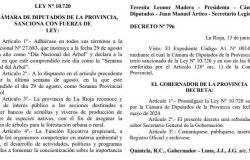In the recent public account made by President Gabriel Boric, two announcements stood out that not only involve legislating on matters that affect citizens, but also include the principle of the autonomy of people in the health field: abortion and euthanasia.
In relation to the regulation of abortion, this mention becomes really important, because even though the Chilean legal system has been regulating abortion for a couple of years – in accordance with the provisions of Law No. 21,303, which decriminalizes the voluntary interruption of pregnancy in three causal, that is, when the woman’s life is at risk, when the fetus has no chance of surviving outside the uterus due to suffering from a congenital pathology, and/or when the pregnancy is the product of rape -, there is no doubt that , in those situations that cannot be classified within such hypotheses, faced with an unwanted pregnancy (such as the delivery of defective contraceptives by the State), many women and/or pregnant people in our country continue seeking their termination in secret, knowing that in Chile such conduct is restricted or penalized, putting their life and health (physical, mental and emotional) at risk by performing said service in deplorable and unsafe conditions, without being able to hold any responsibility to those who carry out said procedure and being prevented from receiving the necessary post-abortion care.
Despite being a practice that has been carried out since time immemorial, currently, in many countries there are restrictions on access to legal and safe abortion – whether due to lack of regulations, political will or inadequate health centers; in the face of this panorama, and taking into account the impact generated by carrying out clandestine abortions, in light of current international instruments on human rights, as well as the review of their interpretations carried out by different organizations. , it is appropriate to consider whether access to voluntary interruption of pregnancy, as a phenomenon related to the sexual and reproductive health of women and/or pregnant people, should be considered in our system as a right, despite the reluctance of some sectors of society. society to decriminalize voluntary abortion, and understanding, of course, that this measure should in no case be considered within family planning policies.
In fact, from the review of the regulations and international jurisprudence on abortion, it is possible to deduce that the denial of access to legal and safe abortion services violates the most basic human rights of women and/or pregnant people ( such as the right to life, right to health and medical care, right to non-discrimination and equality, right to personal security, right to liberty, right to privacy, right to information, right to decide the number of children and interval between births, right to enjoy the benefits of scientific progress, right to freedom of religion and conscience, and right not to be subjected to cruel, inhuman and degrading treatment), since States are responsible for guaranteeing women’s health, describing the laws that criminalize abortion as discriminatory and as an obstacle for them to access medical care, suggesting that all punitive provisions towards those who have undergone abortions be eliminated.
Thus, it is possible to understand that, at the moment, pregnant people cannot make autonomous decisions regarding the voluntary interruption of pregnancy and, consequently, cannot access health benefits that guarantee a legal and safe abortion; and taking into account, at the same time, the complications presented by carrying out this procedure clandestinely, it is up to the States to take all necessary measures to ensure that pregnant people, regardless of their gender identity, have access to abortion. as part of the exercise of their fundamental rights.
On the other hand, and in relation to the Executive’s intention to introduce a bill that regulates euthanasia, it should be noted that said initiative cannot be considered populist, much less immoral. Certainly, today, it is not only relevant to talk about the dignity of the human person from birth and throughout the development of his or her life, but we are faced with the possibility of providing a dignified death to those who have limited health prognoses, having always taking into consideration your will.
In this way, euthanasia – that is, the performance of acts or omissions by a doctor or other health professional intended to cause the death of a person who is sick, with their consent (or that of their representative or relatives), in order to avoid their suffering, bringing forward their death -, is presented to us as a valid option in those cases in which it is not possible to recover an individual’s health or improve their quality of life. Unlike the limitation of therapeutic effort and palliative care, euthanasia emerges as an alternative for those patients who are in a terminal phase of their illness, who, making use of their freedom and autonomy, express their genuine desire. to put an end to their agony and access medically assisted death, with dignity, in order to put an end to their suffering, freeing their family members and/or caregivers from the burden of this type of suffering.
Given that euthanasia is prohibited in our country, the recent presidential announcement allows us to think about the possibility of discussing a text that establishes a regulatory framework that allows a terminal patient to decide how to end their life, in the case of incurable diseases. , irreversible and progressive, with no possibility of response to curative treatments and with a reserved life prognosis.
However, it should be noted that, both in the case of abortion and euthanasia, it is not enough for the person who wants to access this benefit to validly express their consent, but it requires that the treating doctor (and/or or healthcare center to which you resort) do not refuse to carry out said procedure because you consider that it goes against your personal convictions, affecting your conscience and moral integrity, generating a conflict of interest between the health professional (or provider) and the patient before the possibility that he/she wishes to voluntarily terminate his/her pregnancy or access a dignified death.
In this way, the news included in the speech of last June 1, beyond generating different reactions, come to shed light on the need to regulate bioethical and biolegal situations that are related to human dignity, both at the beginning as at the end of life. Indeed, the possibility of legislating on abortion and euthanasia not only has to do with adopting public policies that are pleasing to the “Brava brava of the President” (as some political sectors expressed), but are also of interest to society as a whole, especially in those groups that are in a particularly vulnerable situation.
Precisely, by establishing legal parameters that allow patients to make decisions freely and voluntarily in the event of unwanted pregnancies or seeing that their health is irrecoverable, not only are bioethical criteria included that adjust to the paradigm shift in the healthcare field. , but rather the recognition that corresponds, in our legal system, to the autonomy of will in complex clinical scenarios is given, eliminating any barrier that prevents the proper exercise of this right.






